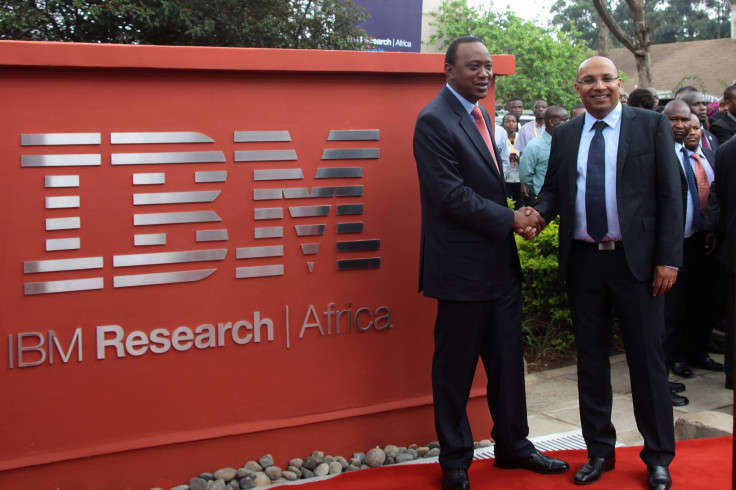Western Tech Giant Comes To East Africa: IBM Launches New Research Facility In Nairobi, Kenya

ADDIS ABABA, Ethiopia -- Global technology behemoth IBM (NYSE:IBM) is ramping up its presence on the African continent with a research lab in Kenya's capital city of Nairobi.
At an official inauguration ceremony there on Friday, Kenyan President Uhuru Kenyatta spoke highly of IBM and the new facility, called IBM-Research -- Africa. "My government is proud that Kenya, and Africa, will benefit from the presence of one of the most advanced research facilities, with some of the world’s most talented people, using some of the most powerful technologies to develop solutions in Africa for Africa," he said, according to a statement from IBM.
This is IBM's 12th international research facility, and its first in Africa. The laboratory has already been operational for more than a year. IBM and Kenya will each invest $10 million in the project during its first five years, and researchers will focus on finding technological solutions to some of Africa's most-pressing problems. One of the laboratory's current projects is to set up a resident scientist program for universities to address Africa's technological skills gap; another is to use analytics to help commuters anticipate and avoid traffic congestion on Nairobi's streets using cameras and a mobile-phone application.
Kenya makes for an ideal technology hub; its economy expanded by 4.6 percent last year, and Nairobi has become a hotspot for Internet-based entrepreneurship on the continent. In mainland sub-Saharan Africa, Kenya is second only to Nigeria in its percentage of Internet users; the communications ministry reports that Internet penetration in the country reached 41.1 percent last year.
But recent threats to political stability threaten to undermine Kenya's ascendancy. Kenyatta was indicted by The Hague's International Criminal Court in 2011 on charges of supporting militias in the violent aftermath of the disputed 2007 elections, when ethnic clashes killed at least 1,200 people. His court date is scheduled for February, and his deputy, Vice President Ruto, has already begun trial on similar charges. The government also suffers from a poor record on corruption. Security is another issue; in September, at least 67 people died in a brutal terrorist attack at a popular shopping mall in the capital city. Pressing concerns like these kept Kenyatta from attending the IBM facility's inauguration on its originally scheduled date of Oct. 29, necessitating a postponement until Friday.
IMB, too, is facing tough times. The company's sales have fallen for the past sixth quarters in a row, dragged down largely by the company's hardware division and slow demand in international markets, particularly China. The last quarterly report in October saw a 4 percent drop in revenue, falling short of analysts' expectations. The 102-year-old company has been pivoting away from its hardware-based history and toward a software focus for two decades, a strategy that proved successful during the late 1990s but has since failed to deliver consistent growth.
But the new facility is expected to help Kenya realize its ambitions in the technological sphere. "The launch of Africa's first full-scale, technology research facility signifies a new era in African innovation," said Kamal Bhattacharya, the director of IBM Research -- Africa, to the Wall Street Journal. "One where commercially-viable solutions to Africa's grand challenges are developed in Africa for Africa, helping to lay the foundations for the continent's future scientific and economic independence."
© Copyright IBTimes 2024. All rights reserved.












